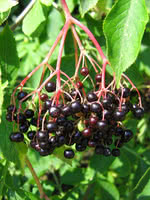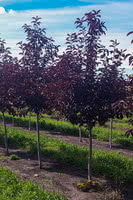Mon-Fri 9am - 5pm Mountain time
Black Elderberry vs Robert Chokecherry
Sambucus canadensis
Prunus virginiana Robert
NOT AVAILABLE THIS SEASON - MIGHT RETURN
NOT AVAILABLE THIS SEASON - MIGHT RETURN
Black Elderberry is a deciduous shrub native to eastern North America. You can plant this shrub in moist areas and it will help stabilize your soil. You can also use it on rural properties anywhere you'd use a lilac.
Black Elderberries are considered to be partially self-pollinating. So while they will still produce some berries without cross-pollination, planting with another variety will increase yields. Consider planting with Ranch Elderberry or Bob Gordon Elderberry.
Warning: the seeds, stems, leaves, roots, and uncooked berries of the Black Elderberry are poisonous to humans when eaten in quantity. You should cook the berries to make them safe for human consumption.
Developed in Barrhead, Alberta, the Robert Chokecherry produces very large berries (comparable to the size of grapes) with good yield.
The berries can be used for wine, jams, jellies and fresh picking, making it one of the sweeter chokecherries. Rich, red foliage make it a striking landscape addition.
Black Elderberry Quick Facts
Robert Chokecherry Quick Facts
Toxicity: leaves, stems, and uncooked berries are poisonous to humans
Toxicity: Toxic to animals with segmented stomachs (horses, cattle, deer moose, etc.)

